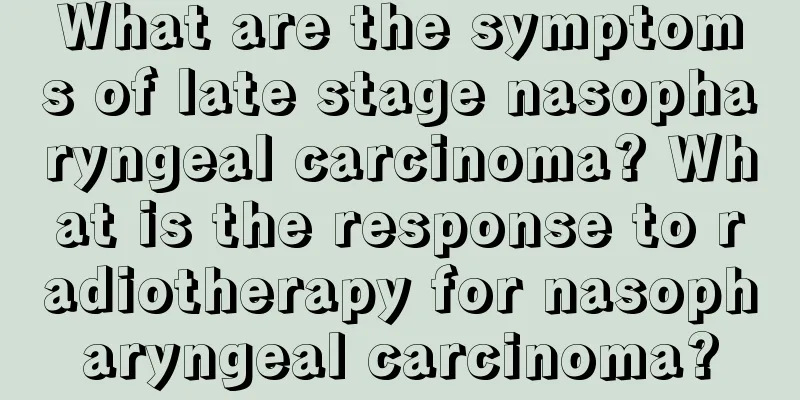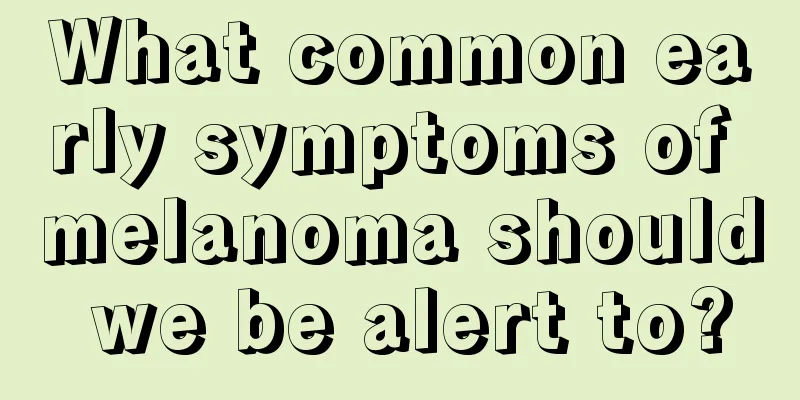What are the symptoms of late stage nasopharyngeal carcinoma? What is the response to radiotherapy for nasopharyngeal carcinoma?

|
Radiotherapy for nasopharyngeal carcinoma is the most effective clinical method for treating nasopharyngeal carcinoma. What are the late symptoms of nasopharyngeal carcinoma? What are the reactions to radiotherapy for nasopharyngeal carcinoma? What are the symptoms of advanced nasopharyngeal cancer? 1. Swollen cervical lymph nodes: In the late stage of nasopharyngeal carcinoma, the tumor metastasizes to the cervical lymph nodes, with an incidence rate as high as 79%. 37% can metastasize to one or both sides. Swollen lymph nodes in the neck are painless, hardened, and not active in the early stage. In the late stage of nasopharyngeal carcinoma, the tumor is adhered and fixed to the skin or deep tissues. 2. Eye symptoms: If the tumor invades the orbit or eye-related nerves, patients with advanced NPC may experience visual impairment or even blindness, visual impairment, diplopia, protrusion of the eyeball and limited movement, neuroparalytic keratitis, etc. Fundus examination can reveal optic nerve atrophy and edema. These manifestations are mostly symptoms of advanced NPC, but some patients with advanced NPC are still treated for this. 3. Symptoms of cranial nerve damage: In the late stage of nasopharyngeal carcinoma, due to the infiltration of nasopharyngeal carcinoma into the surrounding area, any cranial nerve compression will cause corresponding symptoms of late stage nasopharyngeal carcinoma. However, the trigeminal nerve, abducens nerve, glossopharyngeal nerve, and hypoglossal nerve are more affected, while the facial nerve, olfactory nerve, and auditory nerve are less affected. What are the responses to radiotherapy for nasopharyngeal carcinoma? 1. Acute mucosal reactions such as nausea, vomiting, abdominal distension, diarrhea, anorexia, fatigue, leukopenia, erythema, hair loss, peeling, skin ulcers, dry mouth, sore throat, mucosal congestion, edema, etc. Some patients may experience parotid gland enlargement, otitis media, tinnitus, keratitis, etc. 2. Osteoradionecrosis. 3. Radiation myelitis. 4. Radiation encephalopathy Generally speaking, radiotherapy for nasopharyngeal carcinoma will damage the body's functions to a certain extent, and patients will also experience a series of side effects due to radiotherapy for nasopharyngeal carcinoma. |
<<: Can patients with gastric cancer eat sea cucumbers?
>>: What are the three types of pain in the early stage of lung cancer
Recommend
Can I drink scented tea if I have constipation
As we have a deeper understanding of health prese...
What are the treatments for advanced colorectal cancer!
Intestinal cancer (carcinoma of rectum) is a comm...
What are the effects of Keke cough syrup?
Coughing is a defensive reflex activity caused by...
Nursing methods for common symptoms of liver cancer patients after discharge
Liver cancer patients can be discharged from the ...
What are the ways of transmission of botulism toxin
Botulinum toxin is a highly pathogenic bacterium....
The distance between the eyes is narrow
The first impression a girl gives is very importa...
Analyzing the causes of colon cancer in life
Among intestinal cancer diseases, I believe you s...
What are the stages of renal tumor metastasis?
Kidney tumor is a very common malignant tumor, al...
Detailed introduction of fibroids
There are many diseases happening around us in li...
Lymphoma patients may suffer from psychological illness, please pay attention to counseling
The treatment of lymphoma is not just about medic...
What should I do if I have abdominal pain caused by Henoch-Schönlein purpura?
Abdominal pain is a common clinical symptom, and ...
What is the difference between gout and rheumatism?
Gout and rheumatism are both relatively common di...
Benefits of scalp anti-aging
Preventing aging is actually an activity that eve...
Is a premarital medical examination necessary for marriage
Whether to conduct a premarital medical examinati...
What is the best food for liver cancer patients? Dietary considerations for liver cancer ascites
What should liver cancer patients eat? When it co...









